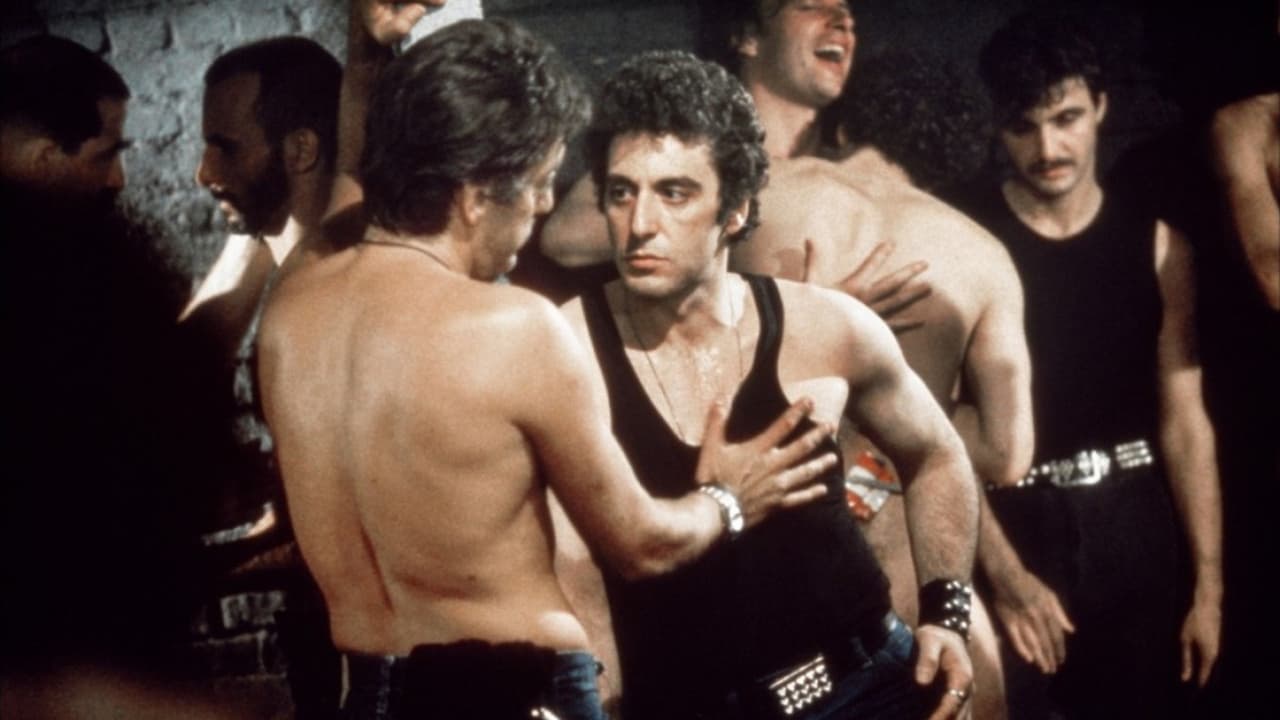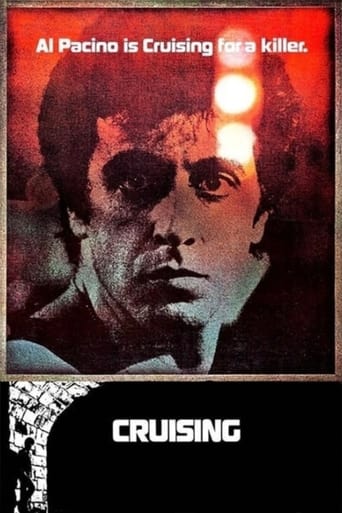



A Brilliant Conflict
It's a mild crowd pleaser for people who are exhausted by blockbusters.
View MoreIt really made me laugh, but for some moments I was tearing up because I could relate so much.
View MoreThrough painfully honest and emotional moments, the movie becomes irresistibly relatable
View MoreCruising (1980): Dir: William Friedkin / Cast: Al Pacino, Paul Sorvino, Karen Allen, Richard Cox, Don Scardino: Disturbing and sexually graphic thriller about a search for the killer of several gay males whose body parts are found in a river. Al Pacino plays Steve Burns, a cop who resembles the victims and is assigned to go undercover to seek out the killer. Director William Friedkin details the film with insightful elements of the gay and leather lifestyle including a scene where he learns what various colored bandannas mean in what pockets. Pacino plays Burns as someone shocked at what he witnesses at these bars but he takes several risks that lead to potential suspects. He grows frustrated and alienated from his regular life. He is also disgusted with the police brutality stemmed from homophobia. Paul Sorvino's role as police chief is more standard issue with barking orders, issuing interrogations and convincing Burns to remain on the case. Karen Allen plays Steve's girlfriend who feels the emotional distance when her boyfriend cannot explain the nature of his case. Richard Cox plays a suspect whom Burns follows after breaking into his apartment. Don Scardino plays a struggling gay playwrite who befriends Burns. The sexual lifestyle showcased here is graphic and certain acts are downright disturbing to watch but it does point to the hostile world such sexual orientations go cruising into. Score: 8 ½ / 10
View More'Cruising' is not an especially good film. Not as a gruseome, gritty crime thriller. Not as an adaption of a crime novel. Not as one of the first mainstream Hollywood films to depict, often quite explicitly, the"after hours" life-style of some gay men.The film depicts – intentionally or not – gay and bisexual men in a manner starkling similar to Hollywod vampires; i.e. nocternal, decadent, amoral and predatory.Granted, it could be argued that the film's decadent aspects – namley the S&M leather bars and depicting the men who visit these bars as willingess to engage in casual, even public, sex acts may be accurate.In the sexual liberation ethos of the 1970s (filming largely took place in the summer of 1979), before the AIDS pandemic, it is certainly possible that this is how some (mostly white, middle class) gay and bisexual men liked to "get down" and party after work.The problem is that 'some' becomes 'all' as far as this film is concerned. The film makers had many creative and simple ways to better depict the gay community without being a bland, public service announcement.The undercover cop has a gay neighbor who is a nice character (played by a terrific actor) but is not really given much to do, except be brutally murdered.Franky, even the film's stars are not really given much to do, largely because the film removed much of character development, motivation and story arches found within the novel.As a crime drama, we have a depiction of the New York City police department that is, frankly, down right scary.I am surprised that members of law enforcement are not as outraged as the gay community is on how this film depicts them. 'Criminal Minds' or 'NCIS, it ain't.The 'investigation' into a serial killer basically boils down to one straight man posing as a regular bar at kinky gay bars in the hopes that the killer will try and pick him up.Basically, this means paying a straight man to dance in sweaty/smoky bars and then being awfully surprised that this is not an effective way to track down a serial killer.Apparently, all that late night dancing (to some funky disco and punk music) gives the undercover agent a sexual identity crisis, which, in turn, transforms him into a gay murderer.After the gay serial killer is caught, the gay neighbor is killed, apparently, by the undercover cop.Yup, our film's hero becomes a gay serial killer after catching a gay serial killer because....um...er....I have no idea. He hung out with gay and bisexual men? His girlfriend dumped him? He listened to punk rock music? The homophobia, sexism and good-old-fashion bad writing in this film makes for a rather tragic triad."Tragic" because the film has got a great cast and crew involved with it. The novel itself could be adapted into a great film. I even enjoyed the retro, 1970s music.Film audiences -- gay or straight -- deserve better. Fans of gritty, crime thrillers deserve better. Heck, fans of vampires or the S&M scene deserve better.
View MoreWilliam Friedkin's controversial 'Cruising' is a challenging and oftentimes frustrating film. The story centers around Al Pacino going undercover to find a serial killer in the gay BDSM culture of late 70's NYC. The story seems simply enough, right? Well, it's deceiving as what Friedkin does is take the audience into a dark abyss of sordid sex, extreme debauchery, and brutal violence. It is, quite honestly, one of the more uncomfortable American films of the period to sit through.The problem with the picture are the character motivations are vague for virtually all involved (Pacino, the killer, and the police chief). Why is the killer doing this? Why is Pacino starting to lose it? What is the deal with the police chief? Does he care about Pacino or not? Everything is so opaque and mysterious that the film is both fascinating and aggravating at the same time. And perhaps that was done on purpose, but considering reportedly 40 minutes was cut from the film I would imagine that many of those questions I posed were more clear. The ending itself is even more strange and confusing and I would suspect that while the ending wouldn't have been wrapped up in a nice little bow for the audience (nor would I expect that in a Friedkin film), the viewer could at least attempt to make more sense of it.
View MoreAfter "The Exorcist" (1973) and "The French Connection" (1971), William Friedkin fell hard and fast into the world of mediocrity. Before his career crashed and burned, however, he made 3 fairly interesting films.Released in 1977, "Sorcerer" was Friedkin's remake of 1953's "Wages of Fear". Both films find a group of international criminals hiding from the law in a small South American village. Struggling to make ends meet they agree to work for an oil company. Their task? Drive truckloads of volatile nitroglycerin over three hundred miles of treacherous jungle terrain. Though tense in places, "Sorcerer" was a huge box office flop. A stupid title and poor marketing meant that audiences stayed well away. Like Coppola, Friedkin took his crew to the jungle and seemed to never quite return. Three years after "Sorcerer", Friedkin directed "Cruising", a little known film staring Al Pacino. Here Pacino plays an undercover police officer who poses as a homosexual man in the hopes of catching a serial killer responsible for murdering several gay men. As such, Pacino infiltrates the "leather bars", a subculture of gay life in which men wear S&M fetish-wear. "Cruising's" a fairly interesting film, but Friedkin's portrayal of gay lifestyles is too caricatural, too derogatory (homosexuals as lair dwelling vampires?), and his plot rarely excites. Worse still is the film's thin vein of homophobia, and Friedkin's aligning of gay sex to physical violence (earlier edits subliminally spliced shots of hard-core penetration into the film's murder sequences). This isn't as dubious as some of Friedkin's other works - the racist/crypto-Imperialist "Rules of Engagement", the death-penalty loving "Rampage", the ultra conservative, science/woman/hippie bashing "Exorcist" etc - but almost. Lifting the climax to 1977's "Looking for Mr Goodbar", Friedkin then ends with Pacino's character's latent homosexuality triggering a self-loathing that sees him assuming the place of the film's killer. This climax has been criticised by many, but is one of the film's saving graces. Here, law enforcement and bourgeois values are portrayed as being inherently repressive, violent and constructed via the destruction of everything that deviates from traditional masculinity. In other words: cops hate gays because they're repressing their own touchy-feely, homo-erotic feelings.Beyond this, "Cruising" boasts some fine cinematography, the director using the black and white motifs of the leather bars to sculpt the entire look of his film. Aside from some cold blues, "Cruising" might as well be monochromatic.Friedkin's last watchable film was "To Live And Die in LA", one of the better crime pictures of the 1980s (see the superior "Cutter's Way"). It stars William Petersen as a Secret Service agent responsible for tracking down a counterfeiter, but Friedkin's plot is unimportant. Savour instead the film's breezy atmosphere, catchy soundtrack and its slick action sequences. What's most interesting about "To Live And Die In LA", however, is its possible influence on director Michael Mann. Petersen would star in Mann's "Manhunter" several years later, a film in which Mann's style changes drastically from the dour tone he initially utilised in "Thief" (1981). Mann seems to have also been influenced by Friedkin's use of the German electronic group Tangerine Dream (who scored "Sorcerer" and who brought synthesisers and trance music to the mainstream) and the stylised visuals that Friedkin had hit upon. Of course Mann's "Miami Vice" was released a year before "To Live and Die", so it may well be Mann who's the influence on Friedkin.Regardless, in many ways "To Live and Die in LA" is the link between the gritty crime films of the 1970s and the more stylised crime films that would came later; the point at which neo-realism meets slick MTV visuals and cutting. In the 1990s, Michael Mann would marry this cocktail to the designer existentialism of Jean Pierre Melville (see "The Samurai", "The Fingermen", "Bob the Gamber"), giving rise to "Heat".5/10 - See "Cutter's Way".
View More